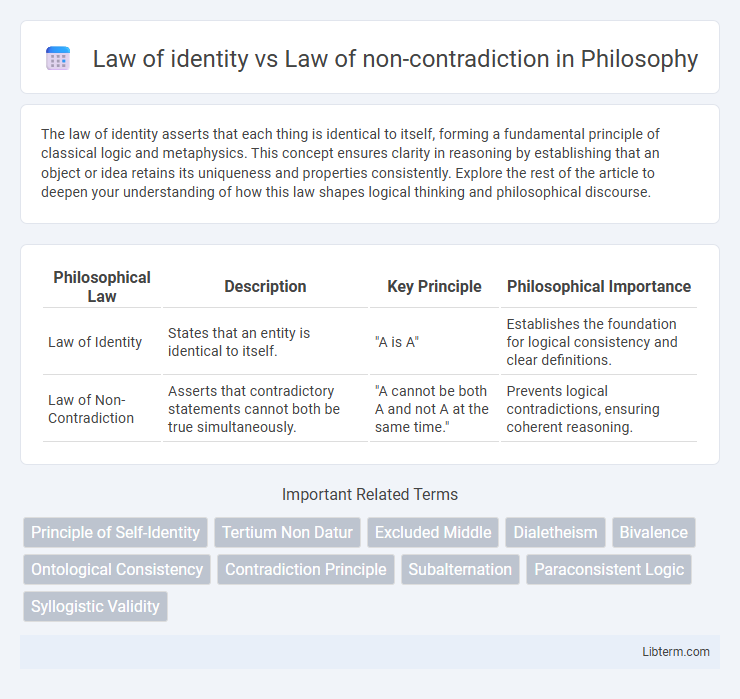The law of identity asserts that each thing is identical to itself, forming a fundamental principle of classical logic and metaphysics. This concept ensures clarity in reasoning by establishing that an object or idea retains its uniqueness and properties consistently. Explore the rest of the article to deepen your understanding of how this law shapes logical thinking and philosophical discourse.
Table of Comparison
| Philosophical Law | Description | Key Principle | Philosophical Importance |
|---|---|---|---|
| Law of Identity | States that an entity is identical to itself. | "A is A" | Establishes the foundation for logical consistency and clear definitions. |
| Law of Non-Contradiction | Asserts that contradictory statements cannot both be true simultaneously. | "A cannot be both A and not A at the same time." | Prevents logical contradictions, ensuring coherent reasoning. |
Introduction to Fundamental Laws of Logic
The Law of Identity states that an object is the same as itself, expressed as A is A, establishing the foundation of consistent reasoning in logic. The Law of Non-Contradiction asserts that contradictory statements cannot both be true simultaneously, meaning A cannot be both A and not A at the same time and in the same respect. These fundamental laws of logic underpin analytical thinking and ensure clarity and coherence in argumentation and philosophical inquiry.
Defining the Law of Identity
The Law of Identity states that an entity is identical to itself and possesses consistent properties across all contexts, symbolized as A = A in classical logic. This foundational principle ensures clarity and coherence in logical reasoning by affirming that each thing is itself and distinct from others. In contrast, the Law of Non-Contradiction prohibits an entity from simultaneously holding contradictory properties, reinforcing logical consistency.
Understanding the Law of Non-Contradiction
The Law of Non-Contradiction asserts that a proposition cannot be both true and false simultaneously in the same context, ensuring logical consistency. This principle is fundamental for distinguishing valid arguments from contradictions in classical logic. Understanding it clarifies how statements maintain coherence by preventing opposing claims from being accepted at once.
Historical Origins and Philosophical Context
The Law of Identity and the Law of Non-Contradiction trace back to Aristotle's foundational works in classical logic, particularly in "Metaphysics," where he formulated these as fundamental principles of reasoning. The Law of Identity asserts that each entity is identical to itself (A is A), providing the basis for stable concepts, while the Law of Non-Contradiction denies that contradictory statements can both be true simultaneously (not both A and not-A), underpinning coherent discourse. These laws emerged in the philosophical context of ancient Greece to address metaphysical questions about existence and truth, shaping Western logic and epistemology.
Key Differences Between the Two Laws
The Law of Identity states that an entity is identical to itself, emphasizing that "A is A," which establishes consistency in defining what something is. The Law of Non-Contradiction asserts that contradictory statements cannot both be true simultaneously, ensuring that "A" and "not A" cannot coexist in the same context at the same time. Key differences lie in their application: the Law of Identity focuses on the stability and definition of entities, while the Law of Non-Contradiction addresses logical coherence by preventing contradictory assertions.
Practical Applications in Reasoning
The Law of Identity, stating that an entity is identical to itself (A is A), ensures clarity and consistency in defining concepts and categories during reasoning processes. The Law of Non-Contradiction, which asserts that contradictory statements cannot both be true simultaneously (A cannot be both B and not B), prevents logical fallacies and supports sound decision-making by eliminating conflicting conclusions. Applying these laws in practical reasoning enhances critical thinking, argument validity, and effective problem solving across various disciplines such as philosophy, mathematics, and computer science.
Law of Identity in Classical Logic
The Law of Identity in Classical Logic asserts that each entity is identical to itself, formally expressed as A is A, establishing a foundational principle for consistent reasoning. This law ensures that every proposition remains unchanged in its meaning throughout logical deductions, reinforcing clarity and precision in argumentation. Distinct from the Law of Non-Contradiction, which prohibits a statement from being both true and false simultaneously, the Law of Identity guarantees the stability of concepts within logical systems.
Law of Non-Contradiction in Everyday Discourse
The Law of Non-Contradiction, stating that contradictory statements cannot both be true simultaneously, is fundamental in everyday discourse for maintaining clarity and coherence in communication. It ensures that people do not accept conflicting truths in the same context, facilitating effective decision-making and logical reasoning. Violations of this law often lead to misunderstandings, debates, and confusion in social, legal, and ethical discussions.
Challenges and Criticisms in Modern Philosophy
The Law of Identity, stating that an entity is identical to itself, faces challenges in modern philosophy regarding objects in flux and quantum entities that defy classical categorization. The Law of Non-Contradiction, asserting that contradictory statements cannot both be true simultaneously, encounters criticism from dialetheism, which accepts true contradictions in certain logical systems. Contemporary debates question the universality and applicability of these laws in contexts such as fuzzy logic, quantum mechanics, and paradoxes, highlighting the need for revised logical frameworks.
Importance of Logical Foundations in Critical Thinking
The Law of Identity establishes that an entity is identical to itself, providing clarity and consistency in reasoning by defining clear concepts and terms. The Law of Non-Contradiction ensures that contradictory statements cannot both be true simultaneously, which is essential for maintaining logical coherence in arguments. Together, these foundational principles underpin critical thinking by enabling precise analysis, preventing contradictions, and fostering valid conclusions in philosophical and analytical discourse.
Law of identity Infographic

 libterm.com
libterm.com